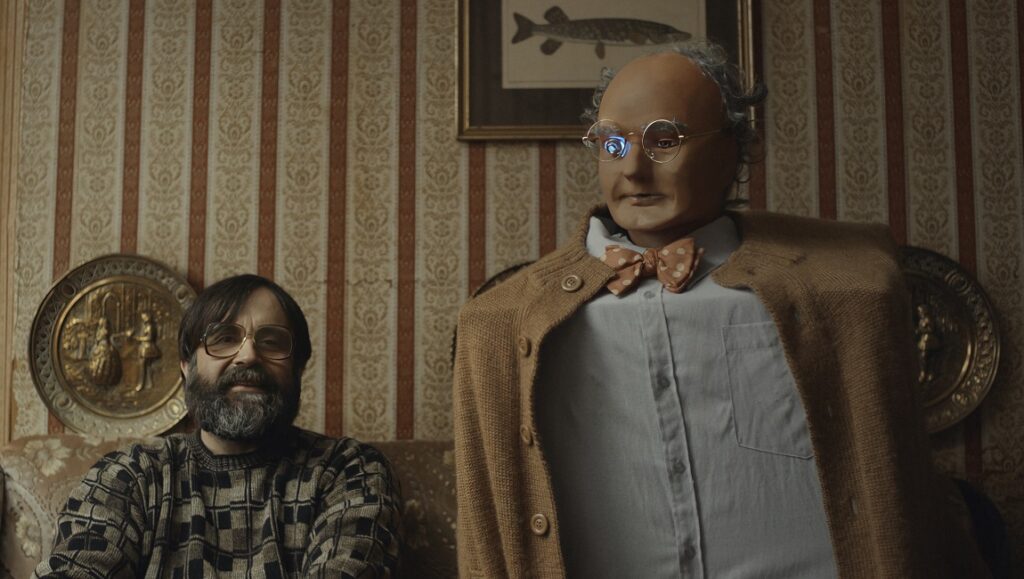Brian and Charles is so lightweight as to risk blowing over at any moment, but is also a wholly endearing affair that will charm more viewers than not.
British comedy Brian and Charles is yet the latest entry in the increasingly ubiquitous “man and robot” subgenre, following closely on the heels of last year’s Tom Hanks-starrer Finch. Those looking for a similar level of big-budget thrills, however, should look elsewhere, as director Jim Archer and co-writers/co-stars David Earl and Chris Hayward have fashioned a tale so twee and so slight that even the gentle whirring of an A.I.’s cooling system could blow it to smithereens. Shot in mockumentary style for reasons never explicated, Brian and Charles follows the titular Brian (Earl), a thirty-something amateur inventor living on the family homestead in a small village in Wales. Quiet and unassuming, Brian spends most of his days tinkering on various doodads and whatsits, the fruits of his labor including everything from a leather egg belt — you know, a belt that holds your eggs — to a flying cuckoo clock. Most are admittedly failures, but as Brian himself states, a mistake can oftentimes hold the keys to success.
That eventual success comes in the form of Charles Petrescu (Hayward), a hulking and boxy seven-foot robot that Brian fashions out of a washing machine and a rubber mannequin’s head. Coming to life one dark and stormy night in an obvious nod to Frankenstein, Charles enters the world eager to experience everything it has to offer, his thirst for knowledge unquenchable. Brian, meanwhile, is just happy to have a friend, someone who will appreciate his droll sense of humor and love of cabbage. Brian and Charles takes the route of so many A.I.-centric tales before it, with Charles’ childlike wonder with the world becoming increasingly poisoned by the inhumanity of man, here represented by village bully Eddie (Jamie Michie), who wants to use the robot as kindling for his annual bonfire jamboree. The film, however, does have a bit of fun with its coming-of-A.I. template, paying particular attention to Charles’ unruly teenager phase, which involves the cheeky robot talking back to his inventor and storming off to his room to blare heavy metal music. Brian, meanwhile, emboldened by his new friendship, gains the courage to start a tentative romance with the equally reserved Hazel (Lousie Brealey), while also summoning the strength to finally confront the aforementioned Eddie, who has been terrorizing the town for decades.
It’s in this way that Brian and Charles is also very much a coming-of-age tale for Brian himself, its theatrics presented in a manner reminiscent of any number of beloved childhood chestnuts such as Stand by Me and The Sandlot, right down to its use of Brian’s wacky inventions to thwart the big, bad, name-calling bully. There’s something rather endearing to this particular element, as each role is played by middle-aged adults, which simply and effectively reinforces the film’s message about finding your true self at any stage of life. At the same time, it also keeps hinting at a barbed satire of millennial culture that frustratingly never comes to fruition. Sporting greasy hair, coke-bottle glasses, a bushy beard, and a bulging belly, bedecked in an old school wardrobe that screams thrift shop, Brian is the epitome of arrested development, withdrawn from the world and obsessed with his futile hobbies, a man caught in a state of eternal adolescence because the world expects nothing more from him. Even the filmmaking’s mockumentary style could be regarded as a meta-joke on the culture’s very specific sense of knowing humor. But Brian and Charles is ultimately far too genteel to get its hands dirty, pushing aside anything even remotely insightful or potentially interesting for bland platitudes on friendship and letting go. That it goes down as easy as it does is a testament to both Earl and Hayward, who create such a charming and likeable dynamic that despite the film’s general shallowness, resistance is fairly futile. There’s no denying that Brian and Charles could have been so much more, but what it ultimately turns out to be isn’t so bad, either, a wholesome and endearing tale that blessedly arrives with nary a fart joke to be found. Charles even delivers a quaint little rap during the film’s end credits; who could say no to that?


Comments are closed.